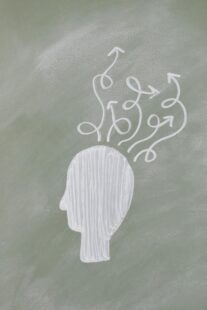When Adult ADHD Causes Problems at Work
Nathan Ainley
Whether you have had ADHD since you were three years old or were just diagnosed as an adult, ADHD symptoms can wreak havoc on your life. Adult ADHD can cause problems at work, leading you to miss promotions and raises. The symptoms can make you appear careless and lazy when, in reality, you may love your job.
It is important to recognize the symptoms of adult ADHD and learn how to find solutions for the problems the mental health condition can create at work.
Symptoms of adult ADHD
 The majority of ADHD cases are diagnosed during the childhood years. If the treatment included techniques for managing the symptoms and learning the necessary skills, the child might experience less severe symptoms as an adult. In other cases, the child may have only been given medication and not been taught essential skills to manage the condition. As adults, they might struggle to keep a job or move up the career ladder.
The majority of ADHD cases are diagnosed during the childhood years. If the treatment included techniques for managing the symptoms and learning the necessary skills, the child might experience less severe symptoms as an adult. In other cases, the child may have only been given medication and not been taught essential skills to manage the condition. As adults, they might struggle to keep a job or move up the career ladder.Some children fall through the cracks, and their behavior is never diagnosed as ADHD. These children grow into adults who may assume they have an issue with risky behaviors or lack of focus.
The following are common adult ADHD symptoms:
- Impulsive behaviors.
- Restlessness and fidgeting.
- Short attention span.
- Poor time management.
- Procrastination.
- Inability to focus.
- Easily distracted.
- Interrupts others.
- Poor organizational skills.
- Trouble finishing projects.
- Always starting new projects or tasks.
- Loses important items.
- Insomnia or trouble staying asleep.
- Anxiety.
- Depression.
- Mood swings.
- Angry outbursts.
Do these behaviors sound familiar? Are you getting behind on your tasks or getting into trouble at work? Adult ADHD can cause problems at work, but there are some things you can do to stay ahead.
Ways adult ADHD causes problems at work
Your adult ADHD symptoms may not be as cut and dry as the ones listed above, or you might be unsure you have ADHD. The symptoms can appear as laziness or only half-doing your job. It may feel as if it takes you all day to complete your work or that meetings are worthless because you cannot seem to focus on the content.
Look at the scenarios below and see how you can salvage the situation.
You get lost in detail-oriented tasks
Your mind may have trouble staying on detailed tasks. Anytime you are presented with a project that requires mental effort, it may seem easier to procrastinate. You might get lost in all the steps necessary to reach the end or become bored with the task.
Since larger projects and tasks with lots of details seem to cause you problems, try breaking each project into smaller tasks. For example, if you work with spreadsheets, split the spreadsheet so that you only need to input a certain amount before you take a break. Break any task into smaller increments to keep from feeling overwhelmed or bored.
You have trouble with work relationships
If you struggle with patience or find yourself interrupting others, you may not have as many work friendships as you would like. Making friends requires showing an interest in others. It means asking others about themselves and actively listening to their answers. It also means being interested in those answers.
We often ask people how they are doing out of a sense of politeness instead of genuine concern. Try to make a conscious effort to want to get to know people by listening and asking questions. If your boss accuses you of not listening, try to take notes during meetings or when being given directions. Clarify important points.
If you have the sudden urge to jump into a conversation when it is not your turn, pause and look the speaker directly in the eye. If you are concerned that you will forget what you want to tell them, jot down one or two words on paper to jog your memory later.
Adult ADHD can bring about angry outbursts and irritability. Stay mindful of your behavior and consider what you will say before reacting to a situation.
You are distracted easily
Inattentiveness is a common symptom of adult ADHD; distractions can throw a sufferer off track for hours. You may start your morning well, but get sidetracked while checking the weather. Your mind might run at warp speed with thoughts outside of the task at hand. If someone calls you or you overhear a conversation, it may take a while to get back on task or remember what you were supposed to do.
While at work, try to minimize distractions. Keep your cell phone out of sight, avoid music and videos, and keep conversations to a minimum. Before you leave work, list tasks for the next day to ensure you know where to jump in when you come into the office.
Make a game out of work. As you split your tasks into smaller increments, use one version of the Pomodoro Technique to block off time to work, and then reward yourself with five minutes of free time to do something fun. For example, work on a task for 25 minutes with little to no distractions, then take a five-minute break to visit the water cooler or ask a coworker about last night’s episode of your favorite show.
You are always tardy
 Tardiness can be traced back to either procrastination or distraction. Do you have a particular bedtime set for each night? If you stay up late, it will be much harder to get up in the morning. You may hit the snooze button several times and then try to rush to get ready for work.
Tardiness can be traced back to either procrastination or distraction. Do you have a particular bedtime set for each night? If you stay up late, it will be much harder to get up in the morning. You may hit the snooze button several times and then try to rush to get ready for work.
Perhaps you know you should get your clothes and lunch ready the night before, but there are too many other things you want to do in the evening, so you procrastinate. Maybe you are dressed for work but then make the mistake of checking your emails or news and get sucked down a rabbit hole. The distraction now has you late for work again.
Create a short evening routine to prepare things for work tomorrow. You can lay out your outfit, prepare lunch, and place everything needed (including your keys) by the door.
You drive the company vehicle recklessly
Impulsiveness and reckless behavior are also common symptoms of ADHD. This behavior expands to include reckless driving of the company vehicle, road rage while driving, and not showing restraint at work. Have you had confrontations with coworkers? Have you had traffic accidents due to speeding or road rage?
Staying aware of your behavior is essential when dealing with people at work. Pause before speaking. Are your next words helpful? Do they reflect Christ-like behavior? In our daily lives, it is easy to forget we are Christians, especially when our minds go in different directions or when we are angry.
If you are speeding to work because you did not leave on time, address the issues with your morning and evening routine. If you are hitting snooze, try only hitting the button once or not at all instead of the five times you usually do.
You start new projects before completing current ones
 Are you familiar with Shiny Object Syndrome (SOS)? With SOS, your mind constantly comes up with new ideas that you feel are worth pursuing. You may become bored with an old project or task because it no longer holds its allure.
Are you familiar with Shiny Object Syndrome (SOS)? With SOS, your mind constantly comes up with new ideas that you feel are worth pursuing. You may become bored with an old project or task because it no longer holds its allure.
People with adult ADHD also deal with Shiny Object Syndrome, often starting new projects while leaving older projects half-done. When this happens, make a note of a new project or task that you would like to consider in the future, then let it lie dormant until you have completed your current tasks.
Eventually, you will get to each new project. When it comes to work, completing tasks is more important than starting a dozen and never finishing any.
When you need help for adult ADHD
Sometimes you need professional help to manage adult ADHD. A Christian counselor can address the typical and the uncommon symptoms and suggest ways to manage the mental condition. You can also discuss how adult ADHD affects your relationships and home life. Call our office today to connect with a Christian counselor specializing in ADHD.
“Meeting”, Courtesy of fauxels, Pexels.com, CC0 License; “Scrambled Thoughts”, Courtesy of Tara Winstead, Pexels.com, CC0 License; “2D2Day”, Courtesy of Suzy Hazelwood, Pexels.com, CC0 License; “Buried in the Mess”, Courtesy of Darya Sannikova, Pexels.com, CC0 License







